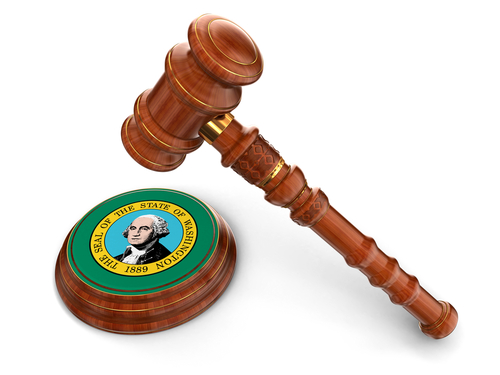Washington admits bar applicant with sex-offender status, based on young age at time of conduct

Image from Shutterstock.
A law school graduate with a 2010 conviction for voyeurism involving shared images of youths can be admitted to practice law in Washington, the Washington Supreme Court found in a 5-4 opinion.
Zachary LeRoy Stevens was 19 years old but presented online as being 16 when he sent an undercover detective posing as a 14-year-old pornographic pictures of minors, according to the Nov. 3 opinion.
The majority finding gives significant weight to his age and lack of mental health support at the time of crime. The opinion reverses a 2019 Washington State Bar Association’s character and fitness board recommendation to deny Stevens’ application.
Washington is a Uniform Bar Examination jurisdiction, and Stevens sought admission there after he was denied admission to the Arizona bar. He’s a 2018 graduate of the Arizona State University Sandra Day O’Connor College of Law.
Law enforcement seized Stevens’ computer and webcam in 2006. The federal government decided not to charge him—based on his age. Utah, where Steven lived, charged him in 2010 with four counts of sexual exploitation of a minor. He pleaded guilty to voyeurism in 2012.
He also has a Utah impaired driving conviction from 2013, which the majority noted was not recent. Additionally, a summary of Stevens’ history is detailed. He grew up in Utah and was raised as a member of a church. He “didn’t quite fit into” the culture of his community, according to the opinion, and he thought that he could not confide in his parents because they would be disappointed in him.
Also, Stevens was diagnosed with ADHD at age 6, and he had a hard time with prescribed medications. As a teenager, he also was prescribed medicine for depression, and that didn’t work either, he said. So he started self-medicating with cannabis and dropped out of high school. Stevens contemplated suicide, and he felt “alienation from his church, community and family based on questions about his sexual orientation,” according to the opinion.
Additionally, Stevens was arrested for selling drugs in 2006. He entered a plea in abeyance, and the charges were expunged in 2008. After his drugs arrest, Stevens’ mental health got worse, according to the opinion. He did attempt to go on a religious mission but was sent home early after disclosing to church leaders that he sexually experimented with “other males when he was younger,” according to the opinion.
Shortly after his mission ended, Stevens started seeing a psychiatrist for depression and psychosexual development. He testified that the treatment was the first time that he felt listened to and understood, and it was also the first time that a health care provider effectively addressed his depression, according to the opinion. While in treatment, Stevens enrolled in college and got a part-time job.
Regarding the illegal online activity when Stevens was 19, he made a conscious effort to appear younger and “sought males” between ages 14 and 18, according to the opinion. That behavior was “dishonest and criminal,” wrote Washington Supreme Court Justice Mary Yu for the majority.
“Yet it was also a desperate attempt to find intimacy by an isolated, developmentally delayed teenager who needed, but had never received, effective mental health care,” Yu wrote.
The opinion also rejected a Washington State Bar Association’s character and fitness board finding that Stevens should submit a mental health evaluation in his admission application. That would be discriminatory, the majority found. It also noted that Stevens successfully completed court-ordered treatment, continues to manage his mental health with prescribed medication, and demonstrated an understanding of what led to his misconduct in relation to his mental health.
“Moreover, by falsely equating Stevens’ mental health history with his current moral character and fitness to practice law, the board majority strongly discourages current and future attorneys and judges from disclosing and seeking treatment for mental health issues, putting them at increased risk for harmful behaviors that are known to plague the legal profession, ranging from alcohol and drug abuse to suicide,” Yu wrote.
The dissent, written by Washington Supreme Court Justice Barbara Madsen, argued that by not giving weight to the Arizona Supreme Court’s opinion denying admission for Stevens, the standard in Oregon was lowered and would encourage “forum shopping” by law school graduates with serious criminal records. She also called attention to Stevens being an adult when his crimes happened and his offenses involving youths who were “significantly younger” than him.
Under the terms of his plea agreement, Stevens must register as a sex offender. He can petition Utah to have his registration obligations terminated in May 2024.
“The fact that Stevens must register as a sex offender until he is eligible to petition for remission is particularly concerning, especially because one of this court’s key responsibilities is to ‘guard the public and its confidence in the judicial system,’” Madsen wrote.
Stevens now works for Honeywell, on subcontracting for government projects, the Associated Press reports via the Corvallis Gazette-Times. He told the wire service that he had planned to move to Washington, but he now may not because he and his wife separated.
“The decision was extremely compassionately written, and it affords a lot of people opportunities that just weren’t available to them. Even if I don’t pursue the practice of law, I’m satisfied this court found merit in my case,” he told the AP.



